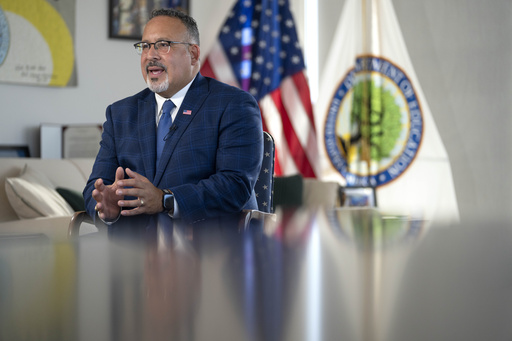WASHINGTON (AP) — President Joe Biden’s education chief said he’s open to using “whatever levers” are available — including federal money — to discourage colleges from giving admissions preference to the children of alumni and donors.
In an interview with The Associated Press, Education Secretary Miguel Cardona said legacy admissions must be revisited for the sake of diversity on campuses following the recent Supreme Court ruling against affirmative action. In a step beyond his previous comments, Cardona said he would consider taking stronger action to deter the practice.
“I would be interested in pulling whatever levers I can pull as secretary of Education to ensure that, especially if we’re giving out financial aid and loans, that we’re doing it for institutions that are providing value,” Cardona said Wednesday. He made the remark when asked about using federal money as a carrot or rod on legacy admissions.
Legacy admissions, long seen as a perk for the white and wealthy at selective colleges, have come under renewed fire since the ruling in June that colleges can no longer consider the race of applicants. By banning affirmative action but allowing legacy preferences, critics say the court left admissions even more lopsided against students of color.
Cardona didn’t elaborate on his options, but the federal government oversees vast sums of money that go to colleges in the form of student financial aid and research grants. The Education Department can also issue fines for civil rights violations, including racial discrimination.
The agency recently opened an investigation at Harvard University after a federal complaint alleged that legacy admissions amount to racial discrimination.
A handful of small colleges have disavowed legacy admissions in the wake of the affirmative action decision, but there’s been no sign of change in the upper echelons of America’s universities.
Some colleges and alumni defend the practice, saying it builds community and encourages fundraising. And as campuses become more diverse, they argue, the benefit increasingly extends to students of color and their families.
Cardona, who attended a technical high school and earned his bachelor’s degree from Central Connecticut State University, has added his voice to the advocates, civil rights groups and Democratic lawmakers denouncing the practice.
“Your last name could get you into a school, or the fact that you can write a check could get you into a school,” he said. But using affirmative action to promote diversity — “that tool was taken away.”
Still, he shied away from supporting a ban of the type proposed by some Democrats in Congress and in several states. Cardona sees it as a matter of local control, with universities having the final decision.
“There is no edict coming from the secretary of Education,” he said.
Without action, Cardona warned that the nation could face the same setbacks seen in California after it ended affirmative action in 1996. The state’s most selective colleges saw steep decreases in Black and Latino enrollment, and the numbers never fully rebounded.
“If we go the route that California went when they abolished affirmative action, what chance do we have competing against China?” Cardona said. “This is more than just ensuring diverse learning environments. This is about our strength as a country.”
Advocates have also pushed the Education Department to start collecting data showing the number and demographics of legacy students.
“I was hopeful we’d be seeing more colleges volunteering to drop it,” said James Murphy, a deputy director at Education Reform Now, a nonprofit think tank. “I think I think they’ve got to keep the pressure on and shine a light on it.”
On other issues:
— Cardona said during the interview that students should be taught about the impact of slavery, including effects that linger today. When slavery ended, it didn’t end the belief in some that African Americans were inferior, and the country is still seeing the effects of unfair housing and lending policies adopted in more recent decades, he said.
“What we don’t want to do is hide the truth and act as if it didn’t happen, or that when it ended, everything was fine. I definitely don’t want to teach that there were some benefits to that for those who were enslaved,” he said.
His remarks were a veiled reference to new education standards in Florida, endorsed by Republican Gov. Ron DeSantis, that require instruction that enslaved people developed skills that “could be applied for their personal benefit.”
Conservatives in many states have pushed for restrictions around how schools address topics related to race and slavery.
— He said “schools should be open, period,” even if there is a new COVID-19 surge. “I worry about government overreach, sending down edicts that will lead to school closures because either folks are afraid to go in or are infected and can’t go,” he said.
He said the sense of community was lost when schools closed early in the pandemic, and that in-person instruction “should not be sacrificed for ideology.”
— Cardona declined to speculate on what the administration’s new student loan forgiveness proposal might look like or whether a final regulation could be in place before the 2024 presidential election. “We are going to work as quickly as possible,” he said. “We know there are students that are waiting, borrowers that are waiting. So many folks are struggling right now to get back up.”
___
The Associated Press education team receives support from the Carnegie Corporation of New York. The AP is solely responsible for all content.
Source: post





